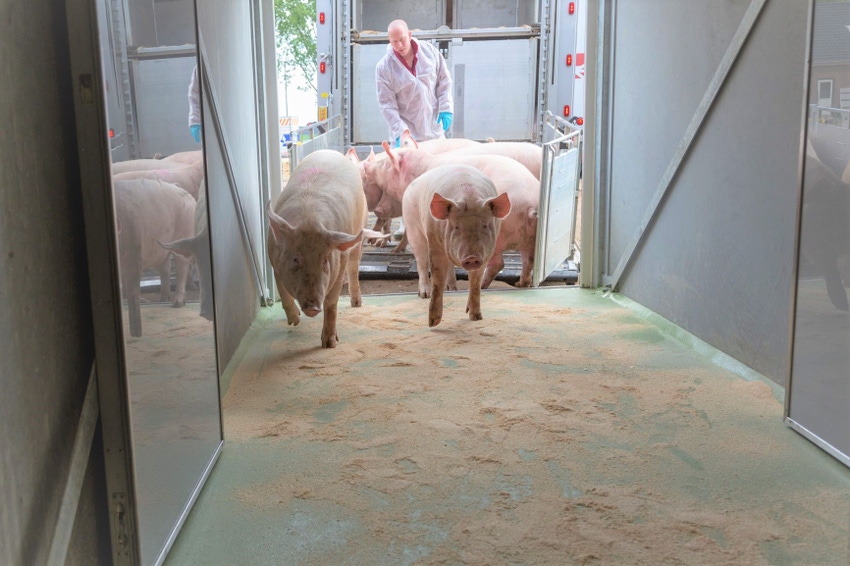De Heus launches practical swine research center
Netherlands facility will link nutrition, climate and husbandry data to discover new insights into practical swine production.
May 20, 2019

Royal De Heus announced May 20 that earlier this month it opened its center for practical research into pig nutrition at "De Elsenpas" in the Netherlands.
Feeding research can now begin following the arrival of the first TN 70-SPF breeding sows, and the inauguration underlines De Heus’ ambitions to take the next step in the continuous development of innovative pig feeds, the announcement said.
Healthy and sustainable pig farming will continue to grow in importance in the future both nationally and internationally, the animal nutrition company said. Rapidly changing and challenging market conditions demand constant innovation. That’s what De Heus said motivates it to focus even more on feeding healthy pigs in the best possible way, with the least possible impact on the environment and society.
De Heus has used this vision to invest in a center for practical research into pig nutrition, in line with the latest animal husbandry, animal nutrition and data technology insights.
The research center conducts nutritional research relating to practical issues, De Heus said. New formulations, raw materials, ingredients or current nutritional issues can be examined carefully, which allows new insights to be translated into practice quickly in the form of innovative pig feeds and the dissemination of knowledge within the international pig farming sector, the company said.
Pig farm replication
The research center functions as a conventional, modern farm with sows, piglets and fatteners, De Heus said, noting that imitating the real world under controlled conditions is a prerequisite for thorough research.
The center has space for 230 sows with accompanying piglets, as well as breeding sows and 900 finishing pigs. This setup lets the company carry out unique nutritional research into all animal groups as well as across the various animal groups for which long-term effects can also be determined. The pigs are fed individually in feeding stations, which makes it possible to examine several feeds concurrently, the company said.
The research center holds specific pathogen-free (SPF) status and has strict external and internal biosecurity.
De Heus noted that a strength of this new research center lies in the huge volumes of data that are collected and analyzed. Identifying each animal through a chip makes it possible to collect and analyze data at the individual animal level from each step in the pig’s life cycle. The pig's climate is monitored continuously. The genetic origin, weight progression and growth results of each animal, up to and including the slaughter, are all documented; when combined with feeding, climate and care, these all provide starting points for further analysis and research, the company emphasized.
This allows for the discovery of new connections and insights, accelerating the growth of knowledge without the need for specific research. The database offers a range of new possibilities for improving feed, services and advice for pig farmers.
According to the announcement, De Elsenpas is the company's most modern research center for pig nutrition. It brings together all of the knowledge De Heus acquires worldwide in cooperation with its pig farming customers and knowledge institutes.
“The investment in the new research center matches our strategy perfectly to combine knowledge and research further and to use it for the development of innovative animal feed products,” Martin Rijnen, group director nutrition at De Heus, noted. “It lets us innovate even more effectively and add more value to the pig chain.”
Johan Zonderland, Pigs Concept development and research team leader, added, “I’m pleased that we’re using De Elsenpas for research. De Heus’ feed innovations contribute to solutions for the challenges faced by pig farming worldwide: an even better use of scarce raw materials, a low-medication pig chain and a better association with society’s wishes and the natural environment.”
Royal De Heus, established in 1911, operates internationally, with the production and commercialization of high-quality animal feeds as its core activity. Its strong international growth in the past few years has led to De Heus now ranking among the top 15 animal feed suppliers in the world.
Outside the Netherlands, De Heus operates in more than 70 countries, including operating companies in Spain, Vietnam, Portugal, Poland, Russia, Myanmar, the Czech Republic, Egypt, Ethiopia, South Africa, Brazil, Serbia, Indonesia, Ukraine and India. De Heus also operates in many foreign markets through the export of concentrates and premixes, in particular to Eastern Europe, Africa and the Middle East.
The company has more than 6,000 employees worldwide -- 650 in the Netherlands. Its head office is located in Ede-Wageningen in the Netherlands.
Source: Royal De Heus, which is solely responsible for the information provided and is wholly owned by the source. Informa Business Media and all its subsidiaries are not responsible for any of the content contained in this information asset.
You May Also Like



